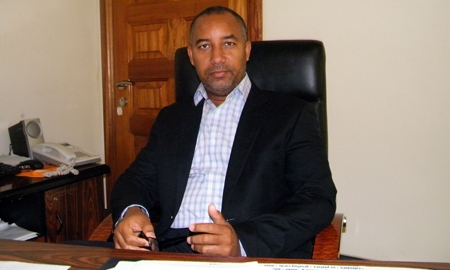Ghana’s National Petroleum Authority (NPA) is a statutory agency whose main aims are to regulate, oversee and monitor the downstream petroleum industry which is currently expanding rapidly across the West African nation. The NPA is there to ensure the continued growth and efficiency of all aspects of the petroleum industry in Ghana, from the time crude oil hits the shore from the oil rigs, to when it is discharged by a refinery or exported.
Heading up the authority is Mr
Alexander KM Mould, the acting CEO of NPA who describes how the country was when all oil and gas was imported: “The downstream sector handles the petroleum product distribution, supply and manufacturing in the country.
The NPA’s role is to regulate all petroleum service providers. If you go back historically, a few multinational companies imported fuel into the country before independence. Post-independence, our leader had the wisdom to set up a refinery in Ghana. It was a very small refinery (about 20,000 barrels), which is small by today’s standards, but it was a significant investment.”
“Oil is a global commodity and if somebody refines a product he is looking to sell the product, so we have to understand the whole dynamics of supply and demand. If we just rely on the traders, they will take us to the cleaners…”
Alexander KM Mould, Acting CEO of NPA |
Mr. Mould joined the National Petroleum Authority (NPA) in April of 2009 with over 20 years experience in leadership positions in the banking and financial sectors with multinational banking corporations in the United States, and nearly a decade of experience in the petroleum downstream sector with focus on refining, crude oil and petroleum products, supply & trading and risk management. Prior to his appointment at the NPA, Mr. Mould was the executive director and co-head of the wholesale bank, origination and client coverage, also in Ghana, where he was responsible for running the corporate side of the business. Previous to this, Mr. Mould had joined Standard Chartered Bank in 1995 in New York as a client relationship manager. He also worked with Union Bank of Switzerland, New York where he was responsible for structured trade finance business within Latin America.
When asked what possible investors need to know about Ghana and the potential of doing business in the country’s economy , Mr. Alexander Mould advises “If you want to win the lottery, you have to buy a ticket, so you have to come to Ghana and understand and meet people and understand the industries, how they are being managed and how you want to get involved. If it is the oil sector, you have to come to the right people – the NPA and the regulatory body for upstream, the Energy Commission for research and information and the ministry for policy. But you have to talk to the right people. We are trying as much as possible to get the right information on the web page.”
“We the public sector have to make sure that we are reachable, which means that you have to be able to access all information that you need. We should also be accessible, so that if you require any other information, you can come to us. This also goes back to our embassies – embassies are responsible for ensuring that they promote Ghana. Ghana needs to be promoted.”
Prior to the NPA opening up the market for bulk distribution companies, there was very little available for outside investors or for Ghanaian business players either. Now, thanks to the NPA, bulk distribution companies can store and ship petroleum and other products from source to market which allows other companies to get involved in the rapidly expanding mining and oil industries of Ghana.
Mr. Mould is keen to emphasise just what it is that the NPA are doing in Ghana; making a young fossil fuels industry run as efficiently as possible.“Oil is a global commodity and if somebody refines a product he is looking to sell the product, so we have to understand the whole dynamics of supply and demand. If we just rely on the traders, they will take us to the cleaners, so we really have to rely on our research team to be abreast with what is going on in the industry. We look at the latest tools being used to manage risk and hedging... We promote efficiencies in our industry.”

0 COMMENTS